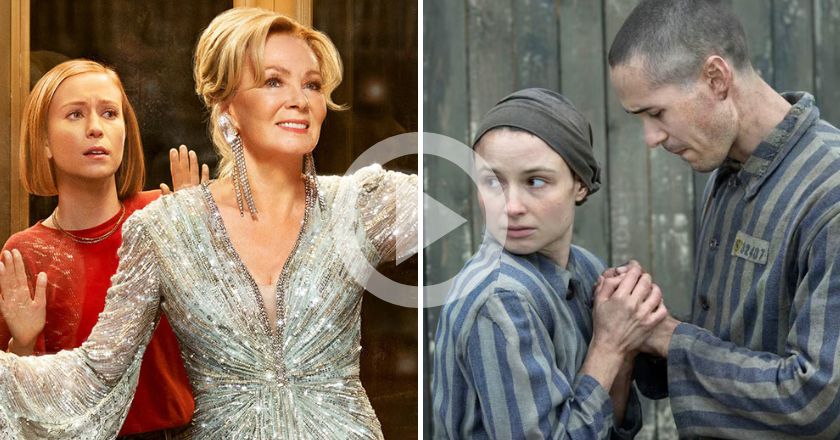
While Daredevil, Marvel’s last Netflix outing, was a few steps removed from the studio’s traditional light-hearted flair, Jessica Jones takes a daring plunge into scary and unknown territory. It’s not so much the darkness of its twisted psychological thriller, or its more grounded take on the superhero world. It’s not even the explicit material, marking more Marvel material you can’t let your kids watch as the studio finally lets us feast our eyes on some superhero boinking. What separates Jessica Jones from all that came before is the maturity and bravery it employs by using its comic book subjects to explore, and explore deeply, concepts of control, abuse, and most importantly, rape. Doing something that is not just impressive for a superhero show, but for any piece of television really, Jessica Jones avoids sensationalizing the heinous crime at the show’s core. Instead, it chooses to analyse, with sensitivity and honesty, the effects it has on people as they try to get on with their lives and the inconceivable reactions that see perpetrators not only unable to take responsibility, but more insidiously, blame the victims.
So yes, Jessica Jones does get into some pretty heavy subject matter, but that doesn’t mean the series doesn’t pack some entertainment punches. Jessica Jones takes many of the core ideas from Brian Michael Bendis and Michael Gaydos’ critically adored comic series Alias (a title already used up for television, hence “Jessica Jones“) and remixes them into a nail-biting game of cat-and-mouse between Krysten Ritter’s titular, super-powered private investigator and David Tennant’s obsessive and terrifying (despite his unconditional love for purple suits) Kilgrave. Like the comic, Jessica is a former victim of Kilgrave who has been trying (and failing) to rebuild her life following her escape from his grasp, though here he is a much more active presence than he was in the original text. As he comes back into her life and subsequently destroys someone else’s, Jessica decides she can’t run again and sets about stopping him for good.

Once again Marvel nail the casting of their lead hero. Ritter’s physicality isn’t exactly what fans of the comic were expecting, but it takes mere seconds before showing she is perfect for Jones’ bitter and sardonic personality. Core to Jessica’s persona is the trauma she experienced under Kilgrave. Broken and racked with guilt and shame, Jess is pissed off at the world for what he did to her and takes it out on herself with bad choices, and lots of whisky. Smartly, the show shifts the exact history the two shared, ensuring both the series and the source material aren’t treading the same ground, but the basic character trajectory – of her crawling out of his shadow and taking control again – remains the same.
While Jess does possess some ambiguous powers (namely super-strength and the ability to sort-of-but-not-really-fly), her stint as a superhero didn’t work out the way she had hoped. She now gets her adventure fix from working as a P.I., and it’s in this capacity that she battles it out with Kilgrave. The nature of his powers make him seem almost unbeatable, so in order to take him down, Jess goes noir on his uptight British ass. The introduction of Hope (Erin Moriarty), a young girl who will spend her life in jail if Kilgrave can’t be exposed, ensures Jess can’t simply kill him and must beat him by gathering intel and launching strategic plays with her little ensemble of fellow Kilgrave victims.
I love that Marvel tries to define different specialties for all their heroes – making them the only ones that could win their particular battles. Sadly, Jessica Jones spends a lot of time telling us about her prowess as a P.I. rather than giving us a look at her be one outside her campaign against Kilgrave. A criticism I had with Daredevil was that we didn’t get enough of Matt Murdoch as a lawyer, and Jessica Jones has the same problem. They do try to include one unrelated case, but it ends up being a clumsy tie-in to Marvel’s shared universe. Desperate to hook their audience on a series about a largely unfamiliar character, the show dives headfirst into Jess vs. Kilgrave, so once they try to dial the tension back down in the second episode with an intent to slowly build it back up again, everything less focused feels like a distraction rather than a chance to build character or expand the world. It’s partially a victim to the episodes not being able to breathe in Netflix’s binge-watching format, but the pacing and structure feel off far too often as a result of the season’s early eagerness.

There are some fun spots of action spread throughout the show, especially whenever Mike Colter’s charming-as-f*ck Luke Cage steps onto the scene, but fans of Daredevil‘s brilliantly choreography action sequences may be a bit disappointed to find Jessica Jones is much less visually thrilling than its predecessor. Don’t get me wrong, the series is shot with a strong cinematic eye, with plenty of interesting angles and classic noir flair, but this is a psychological thriller through and through. The balance of power shifts between Jones and Kilgrave surprisingly often, and the two continue to push each other into being more lethal opponents. Whenever they have their backs against the wall, they spring back and wreak havoc on the other. In truth, this peaks in episode 9, ‘AKA Sin Bin,’ the show’s most intense hour, and it gets slightly frustrating to watch them keep slipping through the others fingers in the following episodes. Thankfully, the excellent cast and their pitch-perfect chemistry keep you captivated.
With the notable exception of one strange and overbearing character who refuses to disappear into the background, Jessica Jones boasts an incredible ensemble. Fans of the comic will know you can’t do Jessica Jones without Luke Cage, whose relationship with her framed the story of the source material. Poised to be the star of Marvel’s next Netflix outing, it was unclear how much time would be devoted to him, but the series strikes the perfect balance. Swooping in early to have you ship Jess and Luke quicker than you can say ‘sweet Christmas’, the show tears your heart out when their past gets in the way of their love, in turn allowing Luke a powerful note for his necessary step out of the spotlight.
Happily, this leaves plenty of room to focus on the friendship between Jessica and Rachael Taylor’s Trish Walker (Hellcat from the comics). The two always believe they are the one protecting the other, and their comradery forms the heart of the show. Her own heroic fantasies are what pushed Jones into her unsuccessful run as a hero, and despite the powers, Trish is just as formidable and strong willed as her friend. Though not quite as exciting a creation as some of the bigger personalities, Taylor is easily the biggest surprise of the show.

Which of course brings us to Tennant’s Kilgrave, who is not only the dramatic engine for the series, but very likely Marvel’s most frightening and engrossing villain to date. Tennant steals the show whenever he is on screen, sending your heart racing with fear of what he could do thanks to the deadly combination of his dangerous power-set and his childlike entitlements and temperament. For all the horrible things he does to everyone around him, he still views himself as the victim. Tennant destroys lives in all directions in his quest to win Jessica’s affection, but not once does he ever take responsibility. This is the horror of a man not used to being told no, to seeing people – especially women – as things. The sick question “How am I supposed to know?” justifies his imposing his will onto others. Even when threatening to force himself onto a woman to deter Jess, he uses the words: “–From your perspective, that would be rape”.
Jessica Jones is ripe with symbols and themes to disassemble and discuss, but at its heart, the show’s message is that taking a choice from someone else is a crime no matter how you try to frame it. Kilgrave’s need to control is a corrupting force, poisoning those around him and leading even Jessica to force her will on the innocent in order to get what she wants. This gives even the show’s protagonist irredeemable moments, having us beg for an end to justifying those who take what they want.
And it’s here that Jessica Jones solidifies itself as essential television. For all the super heroics and bombast it presents, and despite all the plotting missteps and distracting b-stories, the show is engaging in a very real conversation with its audience. Jessica Jones turns out not just to be a show people should watch, but one, tragically, that a lot of people still need to.
THE REEL SCORE: 8/10
– Z.P.







